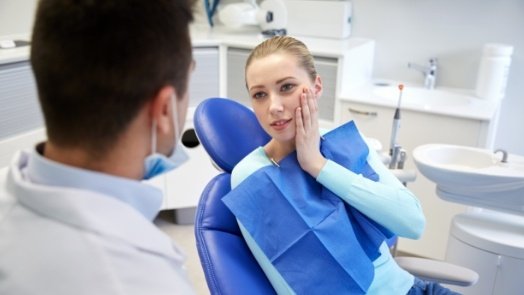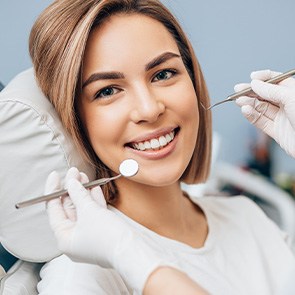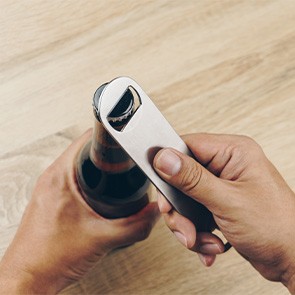Emergency Dentist – Tulsa, OK
Getting You the Help You Need ASAP
As an emergency dentist in Tulsa, Dr. Lindsey Hammond understands that when a dental injury occurs, time is of the essence. From pain to panic, it can be difficult to know what to do when faced with this type of situation. Fortunately, she and her team at Glisten Dental Care of Tulsa want to make sure you are prepared should you or a loved one experience a severe toothache, chipped or knocked-out tooth, or even a lost crown or filling. No matter the issue, it’s always best to call our office and alert us to the situation. This will allow us to get you the help you need in a timely manner. To find out more about how we can better assist you, please contact our dental office.
Why Choose Glisten Dental Care of Tulsa for Emergency Dentistry?
- Same-Day Emergency Dental Appointments Available
- Calming Sedation Dentistry Options In-House
- Soft Tissue Laser Ensures More Comfortable Dental Care
How We Treat Dental Emergencies

- Call Us: The first step you should always take if you find yourself dealing with a dental emergency in Tulsa is to call our office. Dr. Hammond or one of our dental professionals will provide you with over-the-phone first aid guidance to prevent any more harm from coming to your smile and reduce your discomfort. We’ll also schedule your appointment for as soon as possible, typically within the same day you call.
- Get Evaluated: When you arrive, our team will conduct an examination to diagnose the problem at-hand. This can include a physical evaluation of your teeth and gums, X-rays, or even a cone beam CT scan.
- Receive a Treatment Plan: Based on our findings during your evaluation, Dr. Hammond will provide you with a treatment plan to address the problem.
- Undergo Treatment: When you consent to undergo treatment, our team will quickly get to work erasing your pain and restoring the health and appearance of your grin. Before you leave, we’ll schedule any necessary follow-up appointments.
The Most Common Dental Emergencies
Even if you aren’t sure whether your situation requires urgent care, we recommend calling our office. When small dental problems are left to progress, they can require more extensive services down the road, which is why we always recommend being on the safe side of the situation. Below, we’ve included some of the most common issues we treat as dental emergencies.
Understanding the Cost of Emergency Dentistry

Patients are often hesitant to get the dental care they need for two reasons: pain and price. The good news is that our team at Glisten Dental goes above and beyond to ensure that you don’t experience any discomfort in the treatment chair and that you’re never left in the dark about the cost. In fact, you can learn more about the latter right here!
Why Every Dental Emergency is Different

There is a common misconception that emergency dentistry costs the same for everyone. In reality, there are a lot of factors that go into determining the price, including the diagnosis, the severity of the damage, and the treatment that is needed. Before you receive any service, our team will provide you with a detailed cost estimate of the price so you know what to expect. We will also answer any questions you have and review the financial solutions available at this time.
Does Dental Insurance Cover Dental Emergencies?

In addition to covering 100% of preventive care, many dental insurance providers cover between 70% and 80% of minor restorative care as well as 50% of major restorative care. Plus, some dental plans include additional benefits, like a free emergency exam each year. So, it’s definitely worth looking at the fine print on your paperwork to see what is and isn’t covered!
If you need any help navigating the ins and outs of your benefits, we’re here to help. In fact, we are in-network with many popular providers, including Delta Dental BlueCross/BlueShield, MetLife, and Guardian.
Other Options for Making Dental Emergencies Affordable

We’re proud to offer our patients in Tulsa who aren’t insured two financial solutions: our periodic special offers and CareCredit flexible financing. The latter is particularly helpful in cases where extensive restorative or cosmetic care is needed. All you have to do is determine your monthly budget and find the payment plan that works best for you. Signing up only takes a minute or two, and many of the plans have little-to-no interest attached, which makes it even more beneficial for our patients working within a strict budget.
The Secret to Saving on Emergency Dentistry? Taking Care of Your Smile!

Oftentimes, patients don’t think about emergency dental care (or the cost of emergency dental care) until they are in our treatment chair. The reality is that many dental injuries – from minor chips to completely knocked out teeth – can be prevented with the right habits in place. Brushing consistently, coming in twice a year for a checkup and cleaning, eating a well-balanced diet, and wearing a mouthguard during sports are a few examples. It’s also important that you get in touch with us if you start to experience abnormal dental symptoms, like pain when biting down, instead of putting off scheduling an appointment as long as possible.
Keys to Preventing Dental Emergencies

While there’s no way to completely avoid experiencing a dental emergency, there are several steps you can take to reduce your chances of needing to visit an emergency dentist in Tulsa. With this in mind, keep reading to learn a few of our recommendations on how to protect your smile from harm.
Visit Your Dentist for Checkups and Cleanings Every Six Months

For most patients, coming to our office every six months for a dental checkup and teeth cleaning is sufficient. There are some cases, however, where we recommend coming in every three months instead, like if you’re prone to cavities or you’ve had gum disease in the past. In both cases, these routine appointments play a crucial role in preventing tooth decay, clearing away plaque and tartar, and detecting problems like oral cancer early on.
Maintain a Good At-Home Dental Hygiene Routine

Naturally, taking great care of your smile on a daily basis is important too. Start your morning by brushing your teeth for a full two minutes with a soft-bristled toothbrush and fluoridated toothpaste. At night, repeat this process. Then, floss and rinse with an antimicrobial mouthwash for 30-60 seconds. This will help prevent food particles, plaque, and other debris from clinging to your teeth, reducing your risk of periodontal disease, damaged restorations, and tooth decay in the process.
Eat a Balanced Diet

Although delicious, foods that are high in carbohydrates and sugars can wreak havoc on your oral health. That’s why it’s best to keep them to a minimum. Instead, do your best to fill up on lean proteins, raw vegetables, fresh fruits, and other nutrient-dense foods. Not only will this help keep your enamel strong and your gums infection-free, but it will also benefit your overall health too!
Bonus tip: Stay hydrated with water throughout the day to prevent dry mouth!
Never Use Your Teeth to Open Packages

Have you ever used your teeth to tear into plastic wrapping, open a bag of chips, or hold your keys because your hands were full? It’s important that doesn’t become a habit! Otherwise, you’re at an increased risk of chipping, cracking, or fracturing a tooth. For the same reason, you shouldn’t chew on hard items, like your fingernails, pencils, or ice cubes.
Protect Your Teeth If You Play Sports

Whether you play football or you participate in a solo sport, like running or cycling, you need to wear a mouthguard. That way, your teeth are protected from impact and you’re significantly less likely to knock out a tooth. If you don’t have a mouthguard, then contact our team at Glisten Dental Care of Tulsa so we can have one custom-made, ensuring your teeth, your gums, and the soft tissue in your mouth are properly protected.
Dental Emergency FAQs
Dental emergencies rarely happen at a convenient time, so many people are often unprepared for them. Thankfully, Dr. Hammond has gathered some of the most common questions about urgent dental care below for your convenience. If you don’t see the answer you’re looking for, don’t hesitate to call us here at Glisten Dental Care of Tulsa right away to get your oral health back on track!
When is a toothache considered a dental emergency?
While all dental pain or discomfort should be looked at in a timely manner, some toothaches are warning signs of a larger issue that need immediate attention from your Tulsa emergency dentist. Your toothache needs urgent dental care right away if it’s accompanied by:
- Swelling in the face, gums, jaw, or neck.
- Intense pain that lasts for more than 1-2 days.
- Darkening or discoloration of the painful tooth.
- Inflamed, sore, and easily bleeding gum tissue.
- A small, pimple-like bump on the gums.
Will I need a root canal or tooth extraction?
The only way to tell if you need a root canal or tooth extraction is to come visit us at Glisten Dental Care of Tulsa. If your tooth is seriously infected, it can pose a threat to the rest of your mouth as well as your overall well-being.
To eliminate the harmful bacteria while preserving as much of your natural tooth as possible, Dr. Hammond may recommend a root canal to remove all the infected tissue. However, if the tooth cannot be saved, tooth extraction may be needed to prevent the infection from spreading and damaging the rest of your smile. While Dr. Hammond will do everything she can to avoid these treatments, your health is her top priority. She has the experience and training to perform either procedure right here in our Tulsa practice to quickly relieve your pain and correct the issues at-hand.
I have a dental emergency but visiting the dentist makes me anxious. Can you help?
If routine dental care tends to make you feel anxious, you may be very reluctant to seek help even amid a dental emergency. However, you can feel more confident knowing that we always go above and beyond to make every appointment as pleasant as possible. In some cases, Dr. Hammond may offer sedation dentistry options to take the stress out of your visit so you can comfortably sit back and relax while we repair your smile.
Should I go to the ER or an emergency dentist?
In nearly every case, you should bring your urgent dental situation to your emergency dentist for the fast, efficient, and specialized care you need. However, there are a few situations that should be stabilized by your local ER first, including:
- Broken or dislocated jaw.
- Deep laceration that won’t stop bleeding.
- Swelling in the mouth or face that’s causing difficulties swallowing or breathing.
I Need a Dentist for My Family I Need a Checkup & Cleaning I Have a Cavity or Broken Tooth I am Missing One or More Teeth I Want to Enhance My Smile I Want a Straighter Smile I Have Pain in My Jaw I Need a Dentist for My Child I am Scared of the Dentist I am Worried About Bleeding Gums View Our Services
